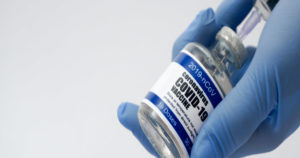CDC Recommendations for Vaccinated Individuals
March 16, 2021 According to data from the Centers for Disease Control and Prevention (CDC), providers have administered more than 100 million doses of the COVID-19 vaccine in the last three months. On average, 2.2 million Americans are receiving vaccines daily. Although individuals who have been fully vaccinated still need to take certain precautions, the CDC says that they can start to do some of the things they had stopped doing during the pandemic.
According to data from the Centers for Disease Control and Prevention (CDC), providers have administered more than 100 million doses of the COVID-19 vaccine in the last three months. On average, 2.2 million Americans are receiving vaccines daily. Although individuals who have been fully vaccinated still need to take certain precautions, the CDC says that they can start to do some of the things they had stopped doing during the pandemic.
When is Someone Fully Vaccinated?
The CDC considers people to be fully vaccinated two weeks after their second dose of a two-dose series, like the Moderna or Pfizer vaccines or two weeks after a single-dose vaccine, like the Johnson & Johnson’s Janssen vaccination. If it has been less than two weeks since you received your shot or you still need to get your second dose, it is critical that you continue to take prevention steps until you are fully vaccinated. Prevention steps that unvaccinated and not fully vaccinated individuals should take include:
- Wearing a mask
- Staying six feet away from others
- Avoiding crowds and poorly ventilated spaces
- Covering coughs and sneezes
- Cleaning and disinfecting surfaces
- Washing your hands frequently
- Monitoring your health daily. Keep an eye out for potential symptoms of COVID-19 infection, like fever, cough, shortness of breath, and new loss of taste or smell.
Important Updates for Fully Vaccinated Individuals
We are still learning what impact the approved COVID-19 vaccines have against the spread of the virus. Because there are so many questions about the efficacy of the vaccines, how long vaccinations provide protection to individuals, and how effective they are at reducing transmission rates, everyone – unvaccinated and fully vaccinated individuals alike – should continue to take basic prevention steps like washing their hands frequently, wearing a mask in public spaces and observing appropriate social distancing guidelines.
For fully vaccinated individuals, however, there are some big changes that most likely come as a relief. According to the CDC updated recommendations, these individuals can:
- Gather indoors with other fully vaccinated people without wearing a mask
- Gather indoors with unvaccinated people from one (1) other household without masks, unless anyone present has an increased risk for severe illness or death from COVID-19. Certain conditions that increase the chance of becoming seriously ill from a COVID-19 infection include cancer, chronic kidney disease, chronic obstructive pulmonary disease (COPD), certain heart conditions (like heart failure and coronary artery disease), obesity, sickle cell disease, smoking, pregnancy, type 2 diabetes mellitus, and a weakened immune system from solid organ transplant
- Avoid testing or quarantining after being exposed to someone who is sick. This means if a fully vaccinated individual comes into contact with someone who has tested positive for COVID-19, he or she does not need to get tested or self-quarantine for 14 days UNLESS they are experiencing symptoms or live in a group setting such as a correctional facility, a detention facility or group home
While it is important to know all the new changes for fully vaccinated individuals, it is equally crucial to know what has not changed. The CDC says that even fully vaccinated individuals should continue to:
- Take basic prevention steps as outlined above, particularly when in public, when gathering with unvaccinated people from more than one household, or when visiting an unvaccinated person with increased risk for severe illness or death from COVID-19
- Avoid medium and large gatherings
- Delay domestic and international travel if possible. If you cannot delay your travel, be sure to observe the CDC’s travel requirements.
- Follow workplace guidance
- Get tested if you are experiencing symptoms, especially if you develop them after being exposed to someone who is ill. If you are experiencing symptoms, quarantine at home and avoid coming into contact with others
We will continue to update our readers on the CDC’s guidelines and recommendations for unvaccinated and fully vaccinated individuals when the agency releases new information. If you have a legal question or concern about exposure to COVID-19, someone at our firm can help. To learn more, contact a representative online now.
Philadelphia Personal Injury Lawyers at Galfand Berger, LLP Representing Injured Individuals Since 1947
With offices located in Philadelphia, Bethlehem, Reading and Lancaster, Galfand Berger LLP serves clients throughout Pennsylvania and New Jersey. To schedule a consultation, call us at 800-222-8792 or complete our online contact form.
 Google Screened
Google Screened
